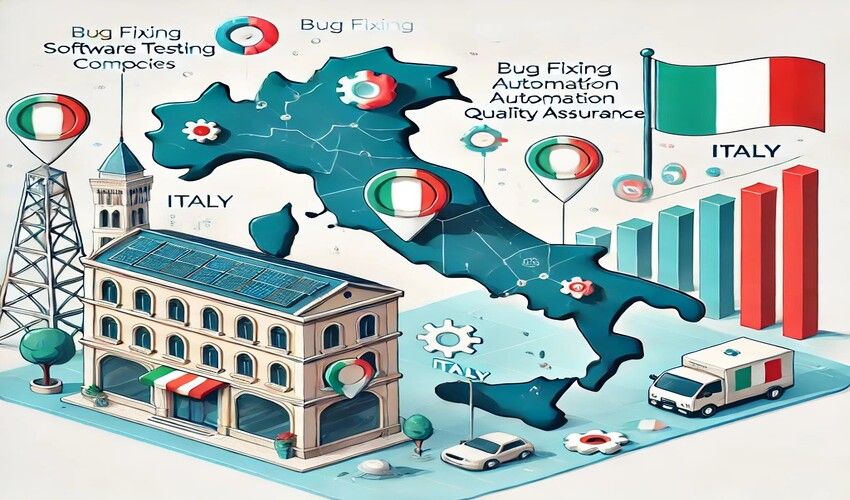Businesses are constantly looking for ways to stay ahead of the competition and streamline their operations in a fast-changing digital world. The use of custom software solutions tailored to the specific needs of companies is one such way in which they achieve this objective. But in 2024, what’s going to happen with the bespoke software? Let’s take a look at some of the trends and innovations that are likely to happen over the coming years.
Bespoke Software
Bespoke Software is a unique solution made for a specific organization or person. This custom software is created to meet the user’s exact needs. It provides a tailored solution just as the user wants it. Unlike off-the-shelf software, bespoke software can be customized.
Advantages of Bespoke Software Customization
- Bespoke software can be tailored to the specific requirements of the user, providing a solution that perfectly fits their needs.
- Custom software can help businesses run more efficiently through the simplification of processes and automated work.
- By providing unique features that are not available in off-the-shelf solutions, custom software can give businesses a competitive edge.
Bespoke Software’s Trends and Innovations in 2024
ImproveShow HardThe future of custom software development is changing. There are several trends and innovations to watch for by 2024. Some key developments include advanced technologies, changes in what consumers expect, and: .
Here we look at the top 25 software trends for 2024. Businesses often create custom software to meet their special needs. This is called bespoke software. We will discuss the top 25 trends in bespoke software for 2024.
1. Artificial intelligence and machine learning
n 2024, AI and machine learning will change how custom software is made. These technologies can simplify hard tasks, improve decision-making, and enhance user experience. AI and machine learning will be crucial for custom software’s future. This includes predictive analytics and natural language processing.
2. Integration with the Internet of Things
The Internet of Things is a trend that will influence custom software in 2024. The Internet of Things is growing, and custom software is part of this. Custom software can connect devices on one platform. This helps businesses control and manage their connected devices. In different industries, like manufacturing and healthcare, custom Internet of Things apps can simplify operations, collect more data, and improve safety.
3. Cybersecurity and Data Privacy
In 2024, cybersecurity and privacy will be the top priority for custom software makers. This is due to growing risks of cyber attacks and data breaches. Security will be a major focus for custom software. This includes using strong encryption and following data protection rules.
4. Utilizing Blockchain Technology
Blockchain can improve custom software development. It helps keep data safe, secure, and transparent. Blockchain’s decentralized data management reduces the risk of data tampering. This can increase trust in custom apps using blockchain technology. Bespoke software with blockchain can make things safer, streamline operations, and lower costs. It can do this in areas like finance and supply chain management, by using smart contracts.
5. Machine Learning Algorithms
Bespoke software is using machine learning algorithms to analyze data and make predictive recommendations.
6. Low-Code Development
Bespoke software development is becoming more accessible to non-programmers through low-code development platforms.
7. Cloud computing
More and more custom software is being hosted on cloud platforms. This allows for greater flexibility and accessibility.
8. Software as a service model
The future of custom software will be impacted by cloud computing and software-as-a-service. Developers can create more flexible and agile solutions by using cloud infrastructure. Businesses can now use custom software on a subscription basis. This makes it easier for them to expand and adapt their software as needed.
9. Advanced security protocols
The need for strong security is greater due to advanced custom software. In the future, security will be built into custom software from the start. This will include using smart security systems that can predict and stop threats quickly. Along with more complex and common cyber threats, it will be crucial to ensure custom software is secure.
10. Adoption of Progressive Web Apps (PWAs)
Progressive Web Apps combine the best of the internet and mobile apps. This is an important trend in custom software development. PWAs can be customized to deliver a smooth, excellent user experience. This replicates native apps but works as web apps. This technology helps businesses interact with users on various platforms. They don’t need to provide multiple software versions.
11. Containerization
Bespoke software is using containerization technology to streamline application deployment and management.
12. Microservices Architecture
A microservices architecture allows you to develop applications more flexibly and scalably. This approach is being used for Bespoke Software. The microservices model breaks down applications into smaller, independent services. This makes the software more flexible and easier to scale as needed.
13. Serverless Computing:
Bespoke software is embracing serverless computing to reduce operational costs and improve performance.
14. Sustainability
Sustainability is now important in custom software. This is because of growing concerns about the environment. In the future, energy-efficient software that uses fewer resources will be important. This software aims to reduce resource use.
15. Green Software Engineering
Key areas of focus will be techniques like “green coding”, efficient data management, and server optimization to align software development with wider sustainability goals.
16. Automated testing
To ensure the quality and reliability of applications, custom software is implementing automated testing.
17. Continuous Integration/Continuous Delivery (CI/CD)
Ethical AI is now very important as it is being used more in custom software. Companies must make sure AI systems are clear, accountable, and unbiased. This helps maintain customer trust and follow regulations. Companies are starting to see the need for ethical AI. Integrating ethical practices into AI development is critical.
18. Ethical AI and responsible development
Ethical considerations and responsible practices in artificial intelligence have taken on increased importance as AI becomes increasingly integrated into custom software. Ensuring that artificial intelligence systems are transparent, accountable, and free of bias is part of this. To maintain customer trust and comply with regulatory standards, companies are beginning to recognize the importance of ethical artificial intelligence. Integrating ethical
19. Cloud-Native Development
The cloud is making custom software more common. Cloud-native tech lets businesses build stronger, more scalable software. This includes containers, microservices, and serverless functions. These tools help create flexible, resilient applications. Businesses can now build software that is easier to maintain and scale up or down as needed.
20. Cross-Platform Compatibility
Bespoke software development is moving towards ensuring cross-platform compatibility with the proliferation of devices and operating systems. This means using technologies such as React Native, Flutter, and Xamarin for mobile development, or Electron for desktop applications that allow developers to write code once and deploy it across multiple platforms. Ensuring that bespoke applications can operate seamlessly on various devices and systems is crucial for maximizing reach and user engagement. To maximize the reach and user engagement, ensuring that custom applications can operate seamlessly on different devices and systems is essential.
21. DevOps practices
DevOps practices are becoming a key part of custom software development. This helps make development and operations work together better. Continuous integration and continuous deployment are very important in the fast-growing DevOps market. These are made possible by using certain strategies.
22. Data Analytical Tools
Bespoke software uses advanced data tools. These tools collect and analyze data to provide useful insights. Businesses can use techniques like predictive analytics, data visualization, and real-time reporting. These techniques help companies understand market trends, consumer behavior, and how well they operate. This gives businesses an advantage over competitors.
23. User-Centric Design
Bespoke software is focusing on user-centric design principles to create intuitive and engaging user experiences. Enhancing user experience (UX) will not only improve customer satisfaction but also drive business success.
24. Integrations between VR and AR
Businesses in different sectors can benefit from the integration of Virtual Reality and Augmented Reality into custom software. Virtual reality and Augmented Reality can provide value-added services that differentiate companies from their competitors, ranging from improving training and simulation systems to offering immersive customer experiences. It’s not just futuristic; custom software solutions incorporating VR and AR are becoming essential tools for enhancing user engagement and operational capabilities in areas such as education, real estate, healthcare, and retail.
25. Personalization
Custom software needs to be changed to offer a more personal user experience. This is because customer expectations are changing. Data analysis and customer feedback are expected to play a bigger role in developing custom software. This will allow the software to adapt based on individual preferences and behaviours.
Conclusion
The future of Bespoke Software in 2024 looks good. Advances in AI, IoT, cybersecurity, and cloud computing will shape this field. Businesses can use custom software to grow, work more efficiently, and gain an advantage in the digital world. But they must stay up-to-date on trends and embrace new ideas.
















Leave a Reply